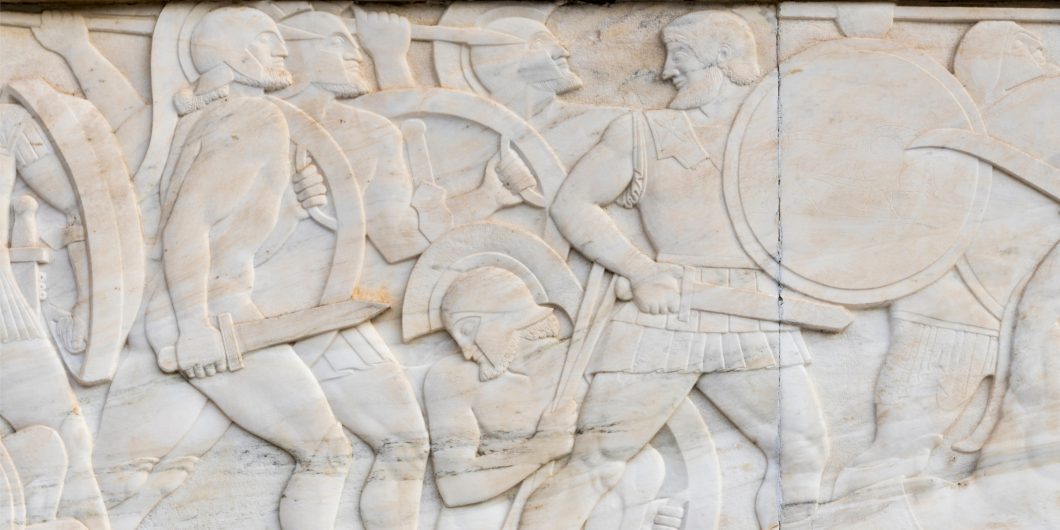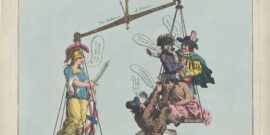Ulysses S. Grant understood the immense difficulties of waging war as a democracy. And he excelled at it like no other.
What Are We Fighting For?
“You gotta learn how to die / if you want to be alive”
– War on War, Wilco
Serving in the Army, you hear quite a few motivational speeches. Some are more memorable than others. One which particularly stands out in my memories of being a young infantryman during wartime was the speech our battalion commander gave as we left our staging area in Kuwait for our duty station in Baghdad. Unlike most of Iraq, Kuwait is true desert, and so the horizon was unbroken, and the heavy sun leaned on us. It felt like the heat held everything to the ground, a replacement for gravity, and the cloudless sky was completely still. It was an appropriately charged backdrop for such a dramatic moment. The Bedouin that we had seen stalking us during our range time off base, just waiting until we finished target practice and shuffled into our buses to leave so that they could collect our spent brass to sell, still sat proudly upright on their camels somewhere in the periphery of my consciousness. The moment felt like it had slipped outside of time. The motionlessness suggested eternity.
I don’t remember many of the details of the speech, only that the 300 were alluded to. It didn’t require more than an allusion, since everyone in the infantry was expected to at least have a passing notion of who the 300 Spartans under Leonidas were and how they held off a massively oversized Persian army until the Lacedaemonians were killed to a man. The battle was a technical win for the Persians, but the bravery of the 300 was so profoundly heroic that their tenacity outlived them. Our battalion commander hoped that we would have a similar toughness. From somewhere behind me I heard a whisper, “Wait, didn’t they all die?” The confused soldier must have gotten a nod or some affirmation, because then the same voice said, “Uh oh . . . well that’s not very inspiring. . .” He just didn’t get it. As the writer Michael Walsh explains in his recently published Last Stands: Why Men Fight When All is Lost, the battalion commander wasn’t suggesting that we should expect to die meaningless deaths. He was trying to tell us that we should live for something bigger than our own mere survival.
As Walsh, an accomplished novelist as well as nonfiction writer, tells us in the introduction, “To observe that war is crucial to civilizational advancement is also to observe the following: that human beings have a larger purpose than simply living out their threescore and ten.” And really this is why men fight and die. Whatever practical fruits war brings us, be it advancements in transportation or medicine, these things nevertheless exist simply as counterpoints to the horrendous loss and suffering of combat itself. But only something far outside the dialectic of material progress can account for the willingness of men to sacrifice themselves, or for parents to sacrifice their children. We suffer violence and squalor, Walsh writes, out of love for one another. A different, much more sterile, way of saying this is to say that we in the West willingly die for the common good. There’s an interesting paradox at the heart of this dynamic:
. . . a culture based on the primacy of the individual serves the common good better via the mechanism of willing self-sacrifice than the regimented, collectivist societies of the East. Western soldiers do not have to be prodded into battle by political commissars. They do not have to be conscripted on a vast and permanent scale. They need not be propagandized to come to the defense of the homeland. The individual, while extolled politically, is dispensable militarily—for the good of all the other individuals.
There might be a bit of oversimplification at play here, but Walsh’s basic premise nevertheless rings true. And in a strange way, his conceit acts as a kind of odd counterpart to the sort of argument Patrick Deneen put forth in Why Liberalism Failed, that through its very success Liberalism has denuded us of the resources through which culture is maintained. Consumers don’t live for anything beyond the next dopamine hit of acquisition, and they certainly don’t sacrifice themselves for something “bigger.” Because what could be bigger than yourself? Only free citizens are able to serve themselves and others simultaneously. And only free citizens who prize the intangible substructure of culture (honor, loyalty, prudence, grit) over fleeting and cheap desire are willing to sacrifice themselves for the common good. “. . . my primary intent here,” writes Walsh, “is to reflect upon how our Western notions of heroism—duty, honor, country, in the face of overwhelming odds—evolved and why they still matter to the survival of our civilization.” Well, they matter to the survival of civilization because they are civilization.
Walsh is aware that what he’s saying isn’t popular and might easily be interpreted as reactionary or retrograde, but he’s comfortable with that. “How retrograde, how antique to our modern ears this all sounds,” writes Walsh.
Both Persians and Spartans died, but only the Spartans died willingly and for a cause that was greater than their own individual survival.
To add to it, this is a book about battles, something that’s been lost to popular common knowledge. A friend of mine asked me not long ago if I had been taught the history of warfare in school, if it had been a priority of the people who educated me to teach me about Waterloo, Shiloh, Midway. It wasn’t. What at one time had been a matter of de rigueur knowledge (if your dad fought in the Battle of the Bulge, you might have taken the time to learn something about it) has been unceremoniously tossed in the wastebin of history. It isn’t simply that the history of major battles isn’t taught in school (at least it wasn’t a part of my schooling), but that no one really thinks about them any longer. And so to structure his book around important battles throughout history as examples of last-stand heroism, from Thermopylae to Hastings to the Chosin Reservoir, is itself a nudge against the prevailing social winds.
It has to be intimidating to write about Thermopylae. So many gifted writers already have. But Walsh rises to the occasion and channels the import and energy of the Spartan stand with aplomb. He’s worth quoting at length here:
For more than two thousand years, historians ancient and modern have located the origins of Western civilization at this narrow pass, threaded between the mountains and the sea, which an invading Persian army needed to traverse in order to annihilate Eve’s most rebellious progeny and reduce them to mere spokes in the wheels of a million soul-crushing chariots. For three days, a small army of Greeks, led by the Spartans, blocked the way not only into Greece but the nascent West itself: the land that would give birth just a decade later to Socrates, and then to Plato and Aristotle. Even as the crows feasted on the carrion of Greek and Persian bodies, Thermopylae defined once and for all what it meant to be Greek, Western, human.
Under Walsh’s pen, the battle is reanimated and once again alive with dramatic importance. The hopeless situation of the Greeks, the value of what was on the line, and the eventual larger victory that the sacrifice of the 300 made possible are each rendered with vividness and pulse. The battle leads Walsh to contemplate “the salient differences between East and West . . . which forms the central question of this book: What is worth fighting and dying for?” The Persians, mostly a slave army, fought for mere survival. But the “calcified East was no match for a rising and vigorous West.” Both Persians and Spartans died, but only the Spartans died willingly and for a cause that was greater than their own individual survival.
The chapter on the American Civil War battle of Shiloh is a stand-out chapter as well. There were bloodier battles (Antietam) and bigger and more popular battles (Gettysburg), but Walsh writes that “no battle of the American Civil War was as important—as determinative of the preservation of the Union—as the battle of Shiloh.” A Union defeat beside the Tennessee River would have surely meant the end of Grant’s career, his final confrontation with Robert E. Lee “postponed indefinitely.” And worse than the loss of Grant, Walsh writes, “a crushing Union defeat might have encouraged England to enter the war on the Southern side.” Much was on the line, but Walsh once again excels at giving us the pulse of the moment itself:
Shiloh was, by all accounts, a baptism by some of the most intense fire any human being had hitherto experienced. Fought on unforgiving terrain of woods, hills, creeks, swamps, marshes, and rivers, the battle was unprecedented in its rate of fire, bullets, shells, shot, and shrapnel whistling through the air, slicing the leaves of the trees to ribbons, and bathing the soldiers in the heavy metal of death . . . Green soldiers who just the day before were learning the disciplines of drill suddenly found themselves in one of the hottest shooting wars in history up to that time.
Walsh is fantastic at painting these miniature, vivid portraits of man rising to the occasion in the most extreme conditions. Last Stands shines when Walsh lets his prose lead the way and gives us colorful and heartfelt renderings of watershed moments in time. If there is a weakness to this book, it’s that it sacrifices a bit of intellectual heft and cultural complexity at the altar of thumos. The sacrifice is worth it. There are bone-simple verities too elusive for pedanticism. As Walsh writes in the final chapter of the book, on the battle for the Chosin Reservoir, “Try as man might, he has not yet found a way to elide the fates of Cain and Abel: not through the various peaces of Westphalia et al; neither via the League of Nations, the Kellogg-Briand Pact, nor the United Nations. Not through negotiations, or even ‘peace through strength’. The Pax Romana failed; so will the Pax Americana, and whatever follows it. In the end, it seems, there will be blood.”



